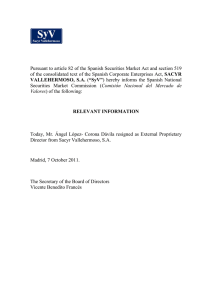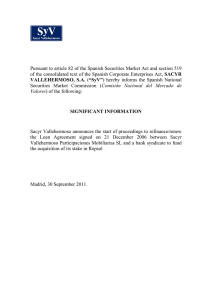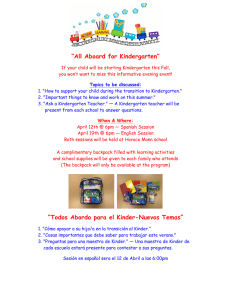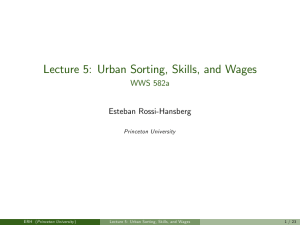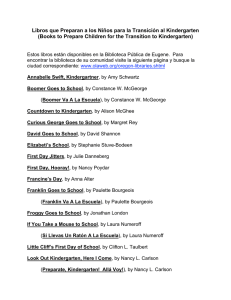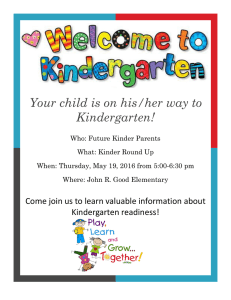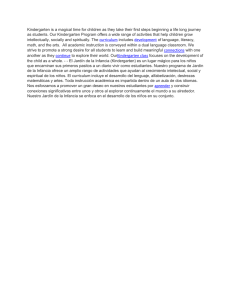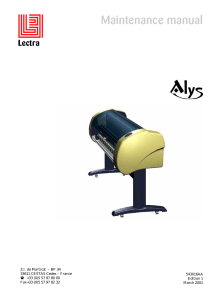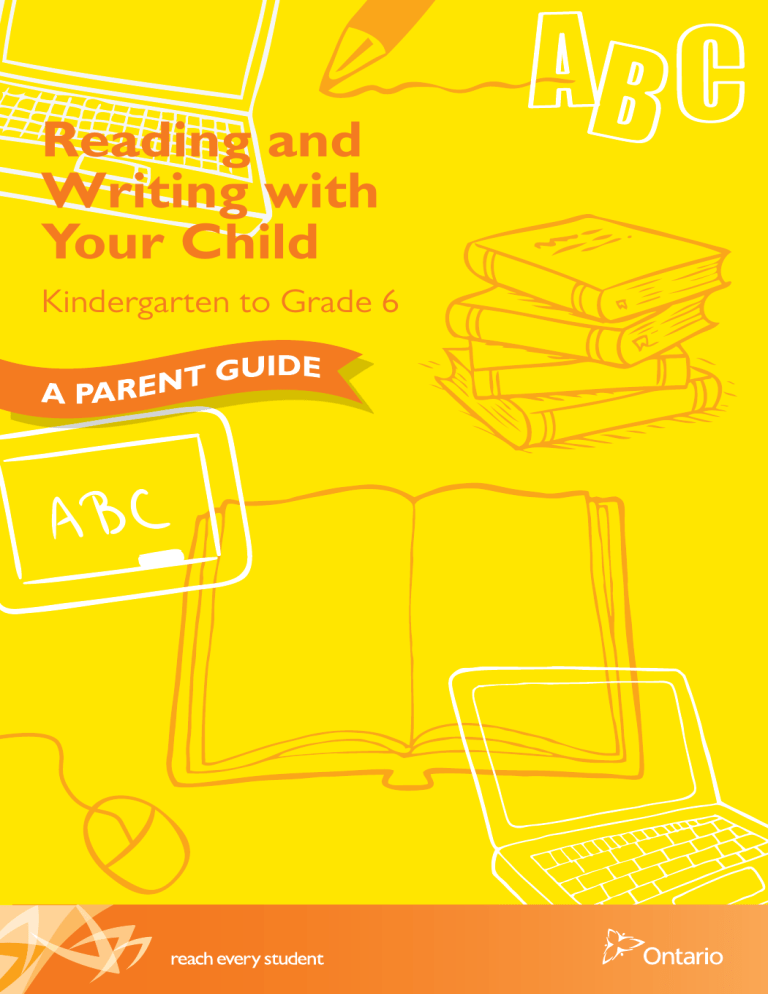
Reading and Writing with Your Child Kindergarten to Grade 6 Thin king g n i t i r W Reading and Writing with Your Child, Kindergarten to Grade 6 is an update of the Ontario Ministry of Education’s Helping Your Child with Reading and Writing: A Guide for Parents. Produced by the Literacy and Numeracy Secretariat in partnership with the Parent Engagement Office. New to this edition: links to games and activities onTVOkids.com. g n i d Rea Contents Note to Parents ..............................................................................................................................................2 How Can I Support My Child’s Learning? ..........................................................................................3 Reading and Writing Milestones .............................................................................................................4 Before your child begins to read and write ..................................................................................5 ;LIR]SYVGLMPHMW½VWXPIEVRMRKXSVIEHERH[VMXI ....................................................................6 As your child learns to read and write ...........................................................................................7 %W]SYVGLMPHFIGSQIWEQSVI¾YIRXVIEHIVERHEGPIEVIV[VMXIV ..........................................8 As your child continues to grow as a reader and writer ............................................................9 Four Top Literacy Tips for Parents .......................................................................................................10 Talk with your child ...........................................................................................................................10 Build habits of understanding .........................................................................................................12 Read every day....................................................................................................................................14 Make it fun, make it matter ..............................................................................................................16 Expect the Best of Your Child ...............................................................................................................18 Online Resources ........................................................................................................................................19 The greater the support that families provide for their children’s learning and educational progress, the more likely that their children will do well in school and continue on with their education. Karen Mapp and Anne Henderson, 2002 A New Wave of Evidence: The Impact of School, Family, and Community Connections on Student Achievement Reading and Writing with Your Child, Kindergarten to Grade 6: A Parent Guide 1 NOTE TO PARENTS =SYEVI]SYVGLMPH´W½VWXXIEGLIV With your support, your child will grow up to become an excellent reader with strong writing skills – and what a difference that will make when he or she enters college, university or the workforce one day! You don’t need a lot of special skills to help your child learn to read and write. Just spending time with your child doing everyday activities makes all the difference in the world. Whether your child is just starting out or can already read and write, there is always room for more learning. As your child grows older, he or she will enjoy new STTSVXYRMXMIWERHRI[WYGGIWWIWFIGEYWIE½VWXXIEGLIV¯]SY¯XSSOXLIXMQIEXLSQI to actively talk, play and listen. All this helps reinforce what your child learns at school. We have created this guide to help you support your child. All tips are based on Ontario’s curriculum and are connected with what your child is learning in school. Remember, lifelong success starts with strong reading and writing skills. And that means your child’s lifelong success starts with you. Have fun learning together! Please note: In this guide, the word parent refers to parents, guardians, caregivers and other family members who help children learn to read and write. 2 Reading and Writing with Your Child, Kindergarten to Grade 6: A Parent Guide HOW CAN I SUPPORT MY CHILD’S LEARNING? Learning to read and write happens at school AND at home. This guide contains practical information that will help you support your child with reading and writing at home. It suggests easy and fun activities that you can do with your child – from reading food labels and writing grocery lists, to talking together on the way to sports practice, to discussing a movie with the entire family. All these shared experiences will help develop your child’s literacy skills. The home-school connection is also important to your child’s success. When children WIIXLIMVTEVIRXW[SVOMRK[MXLXLIMVXIEGLIVWXLI]JIIPQSVIWIGYVIERHGSR½HIRXEFSYX WGLSSP8EPOXS]SYVGLMPH´WXIEGLIVXSLIPTFYMPH]SYVGLMPH´WGSR½HIRGIERHXS½RHSYX more about how you can support your child’s learning. All children change physically, intellectually, emotionally and socially as they grow up. Yet each child brings unique abilities, needs and experiences to learning. By acknowledging – ERHEJ½VQMRK¯]SYVGLMPH´WYRMUYITIVWSREPERHGYPXYVEPMHIRXMX]]SY[MPPLIPT]SYVGLMPH ¾SYVMWLEWEVIEHIVERH[VMXIV Finally, remember that learning to read and write does not take place all at once. Everyone learns at a different rate. It just takes time, practice and support. Whenever ]SYGER[LIVIZIV]SYGERIRGSYVEKI]SYVGLMPHERHWLS[XLEX]SYLEZIGSR½HIRGIMR his or her abilities. Reading and Writing with Your Child, Kindergarten to Grade 6: A Parent Guide 3 READING AND WRITING MILESTONES The best time for children to start learning to read and write is when they are very young. This is when they begin to develop positive attitudes and basic skills. Reading to children and talking to them about their ideas (even if those ideas don’t make sense to you right away) helps children reach a deeper level of understanding. If you and your child are more comfortable in a language other than English, please use it! Reading and XEPOMRKXS]SYVGLMPHMRXLIPERKYEKISJ]SYVLSQIMWZIV]FIRI½GMEP Learning to read and write involves a number of stages that eventually lead to reading ¾YIRXP]ERH[VMXMRKGPIEVP]8LIRI\XJI[TEKIWGETXYVIXLIHIZIPSTQIRXSJPMXIVEG]JVSQ the early years to the junior grades and beyond. 4 Reading and Writing with Your Child, Kindergarten to Grade 6: A Parent Guide READING AND WRITING MILESTONES Before your child begins to read and write Young children are eager learners and can develop literacy skills in a variety of ways. In this stage, your child: 0MOIWXSFIVIEHXSERHXSPSSOEXFSSOWSV[SVHW 0IEVRWEFSYX[SVHWF]TPE]MRK[MXLPIXXIVFPSGOW looking at picture books, playing with magnetic letters, WMRKMRKWSRKWERHVIEHMRKWMQTPIXVEJ½GWMKRWSVPSKSW on food packages &IKMRWXSYRHIVWXERHXLEXLMWSVLIVS[RXLSYKLXW can be turned into text, whether on paper or on a computer, by using pictures, symbols and letters &IKMRWXSEGXPMOIEVIEHIV¯JSVI\EQTPILSPHWEFSSO or e-reader, or works a computer mouse and pretends to read &IKMRWXSEGXPMOIE[VMXIV¯JSVI\EQTPILSPHWETIRGMP crayon or marker and pretends to write, types on a keyboard, makes letters with modelling clay 9WIWFSXLVIGEPPERHTMGXYVIWXSXIPPXLIWXSV] -WGYVMSYWERH EWOWPSXWSJUYIWXMSRWEFSYXLMWSV her world For some fun things to do, visit www.tvokids.com and click on Ages 2 to 5 for these great games. Letter/sound recognition (phonics) Magic Mailbox ABC’s Click on the mailbox to hear the different letter names of the alphabet. www.tvokids.com/games/ magicmailboxabcs Letterella (Beginner Level) Learn the different letter sounds of the alphabet. www.tvokids.com/games/letterella Reading around us (environmental print) Sign Match Match the signs that you see around you. www.tvokids.com/games/signmatch Understanding what we read (reading comprehension) Out of Order Put the story pictures in order. www.tvokids.com/games/outorder Gisèle’s Big Backyard Book Club Listen to great stories! www.tvokids.com/activities/ gisèlesbigbackyardbookclub Reading and Writing with Your Child, Kindergarten to Grade 6: A Parent Guide 5 READING AND WRITING MILESTONES ;LIR]SYVGLMPHMW½VWXPIEVRMRK to read and write ;LIRGLMPHVIREVI½VWXPIEVRMRKXSVIEHERH[VMXIMXMW important to talk about the ideas they are reading about. This will help build their comprehension skills. In this stage, your child: &IKMRWXSQEXGL[VMXXIR[SVHWXSWTSOIR[SVHWERH to see relationships between sounds and letters &IKMRWXSI\TIVMQIRX[MXLVIEHMRKERHWE]W[SVHWSYX loud when reading *MRHWTMGXYVIWSRXLITEKISVWGVIIRLIPTJYPMR understanding the meaning of words &IKMRWXSI\TIVMQIRX[MXL[VMXMRK¯JSVI\EQTPI writes symbols that resemble letters, writes groups of random letters and then eventually writes real words %WOWUYIWXMSRWEFSYX[LEXLISVWLI[SYPHPMOIXS learn (encourage this interest!) For some fun things to do, visit www.tvokids.com and click on Ages 2 to 5 for these great games. Letter/sound recognition (phonics) Alphabet Goop Learn all about the beginning sounds of familiar words. www.tvokids.com/games/alphabetgoop Letterella (Pro Level) Learn all about the beginning sounds of familiar words. www.tvokids.com/games/letterella Rhyming: nursery rhymes and rhyming words Loosey Goosey Rhymes Learn all about words that rhyme in nursery rhymes. www.tvokids.com/games/ looseygooseyrhymes Rhyme Time Watch, click, learn and listen to these fun nursery rhymes. www.tvokids.com/games/rhymetime Words we often see: sight words/high-frequency words Melvin’s Marvellous Words Learning sight words helps you become a better reader. www.tvokids.com/games/ melvinsmarvellouswords Melvin’s Marvellous Stories Learning sight words helps you become a better reader. www.tvokids.com/games/ melvinsmarvellousstories 6 Reading and Writing with Your Child, Kindergarten to Grade 6: A Parent Guide READING AND WRITING MILESTONES As your child learns to read and write ;MXLVIKYPEVTVEGXMGIGLMPHVIRHIZIPST¾YIRG]MRVIEHMRK and writing. At the same time, they will also learn to think more deeply about the stories or information that they read. In this stage, your child: -WEFPIXSEHETXLMWSVLIVVIEHMRKXSHMJJIVIRXX]TIWSJ reading materials, recognizes many words, knows how to make sense of words and is willing to try reading new things ;VMXIWWMQTPIWIRXIRGIWF]YWMRKVIEPPIXXIVWWTEGIW between words and some punctuation For some fun things to do, visit www.tvokids.com and GPMGO%KIWERH9RHIV for these great games. Spelling: spelling familiar words Word Hunt Hangman the tvokids.com way. Play the winter version too! www.tvokids.com/games/ vikingwordhunt and www.tvokids.com/games/ vikingwinterwordhunt )RNS]W[VMXMRKERHWLS[WMRXIVIWXMR[VMXMRKMRHMJJIVIRX ways – for example, writes grocery lists, short emails or text messages Word Magic Practise spelling by yourself or with another player. www.tvokids.com/games/wordmagic 7XEVXWXSFIE[EVIXLEXQIHMEEVIYWIHJSVHMJJIVIRX purposes – for example, to educate, to convey a message or to sell something Understanding what we read (reading comprehension): describing objects Bump-A-Word 9WIHIWGVMFMRK[SVHWMR]SYV writing to make it more interesting. www.tvokids.com/games/ tumbletownbumpaword Grammar: parts of speech Big Escape Learn about nouns, verbs, adjectives and many other grammar goodies. (Be sure to check out all four chapters of The Big Escape.) www.tvokids.com/games/bigescape Reading and Writing with Your Child, Kindergarten to Grade 6: A Parent Guide 7 READING AND WRITING MILESTONES %W]SYVGLMPHFIGSQIWEQSVI¾YIRX reader and a clearer writer Fluent readers think about what they are reading in the context of other experiences they have had. In this stage, your child: 'SRRIGXWMHIEWERHI\TIVMIRGIWMRTVMRXXSLMWSVLIV own knowledge and experience 4VIHMGXWIZIRXWMREWXSV] :EPYIWVIEHMRKERHHSIWWSSRLMWSVLIVS[RMRMXMEXMZI )\XIRHWVIEHMRKWOMPPWXS[VMXMRKERHFIKMRWXS 9WIEZEVMIX]SJWXVEXIKMIWXSWTIPP[SVHWGSVVIGXP] 9WIEZEVMIX]SJX]TIWSJWIRXIRGIW - Write about things he or she cares about (it could be your family, a video game or a pet) For some fun things to do, visit www.tvokids.com and GPMGO%KIWERH9RHIV for these great games. Word fun: spelling, comprehension, word games The Amazing Spelling Fleas Fun with grammar, spelling and reading comprehension. www.tvokids.com/games/ EQE^MRKWTIPPMRK¾IEW Spelling: spelling unfamiliar words Spot and Spell Try to spell all the words correctly. www.tvokids.com/games/ spotandspell Reading Round-Up Word search the tvokids.com way! www.tvokids.com/games/ readingroundup Reading: book titles and reviews for all levels Tumbletown Reads Book Club Read book reviews written by kids. www.tvokids.com/activities/ tumbletownreadsbookclub 8 Reading and Writing with Your Child, Kindergarten to Grade 6: A Parent Guide READING AND WRITING MILESTONES As your child continues to grow as a reader and writer Critical literacy is the practice of examining and discussing the underlying messages in print or in other media in order to understand the world in which we live. Children are practising critical literacy skills when they think about the purposes for writing and talk about how texts (that includes books, websites, magazines, posters and so on) represent different points of view, beliefs and perspectives. In this stage, your child: -WEFPIXSVIEHERHYRHIVWXERHHMJJIVIRXX]TIWSJXI\XW more precisely and quickly and with expression -WEFPIXSVIEH[VMXIERHGVIEXIEZEVMIX]SJQIHME to express opinions and points of view (such as creating and watching videos, blogging, and reading graphic novels) -WMRXIVIWXIHMRXLIWSGMEPEWTIGXSJVIEHMRKERH writing and enjoys sharing thoughts and ideas about the texts he or she chooses (such as by sharing ideas in discussion with friends, on social media sites and through instant messaging) For some fun things to do, visit www.tvokids.com and GPMGO%KIWERH9RHIV for these great games. Word fun: spelling, comprehension, word games The Amazing Spelling Fleas Fun with grammar, spelling and reading comprehension. www.tvokids.com/games/ EQE^MRKWTIPPMRK¾IEW Spelling: spelling unfamiliar words Spot and Spell Try to spell all the words correctly. www.tvokids.com/games/ spotandspell Reading Round-Up Word search the tvokids.com way! www.tvokids.com/games/ readingroundup Reading: book titles and reviews for all levels Tumbletown Reads Book Club Read book reviews written by kids. www.tvokids.com/activities/ tumbletownreadsbookclub Reading and Writing with Your Child, Kindergarten to Grade 6: A Parent Guide 9 FOUR TOP LITERACY TIPS FOR PARENTS TIP ONE 8%0/;-8,=396',-0( Learning is a result of listening, which in turn leads to even better listening and attentiveness to the other person. In other words, to learn from the child, we must have empathy, and empathy grows as we learn. Alice Miller, 2002 For Your Own Good It may seem obvious, but it as important to listen to as to talk with your child. Children develop the skills for reading and writing through both talking and listening. You help your child learn about how words work when you: 7SYRHSYXPIXXIVWMRTVMRXWYGLEWWMKRWSRXLIWXVIIX 7MRK[SVHKEQIWMR[LMGL]SYVGLMPHVITPEGIWFIKMRRMRKWSYRHWXSQEOIRI[ funny words -RZIRXWTIPPMRKF]YWMRKXLIPIXXIVW]SYVGLMPHORS[WXSWTIPPRI[[SVHW Talk also builds your child’s capacity for understanding new things. This kind of talk goes beyond telling your child something (such as, “It’s time to brush your teeth,” or “Wash your hands before dinner”) to having a conversation with him or her. Here are some ways to get this kind of talk going in your home: s 4ALK WITH YOUR CHILD ABOUT PROBLEMS AND SOLUTIONS Talk about how you might QEREKIHE]XSHE]TVSFPIQWWYGLEW½RHMRKXMQIXSQEOIHMRRIVWSXLEX]SY[MPPFI VIEH]XS[EXGLEJEZSYVMXI8:WLS[SVKSSRPMRIXSKIXLIV 10 Reading and Writing with Your Child, Kindergarten to Grade 6: A Parent Guide FOUR TOP LITERACY TIPS FOR PARENTS s -AKE SURE YOUR CHILD HAS TIME TO THINK It sometimes takes time to think of what to say next. Be ready to wait for what your child has to say. If he or she says, “I don’t know what I think,” wait for a better answer – there’s one in there somewhere! s 4ALK WITH YOUR CHILD IN HIS OR HER lRST LANGUAGE Children transfer their ORS[PIHKISJSRIPERKYEKIXSERSXLIVZIV][IPP7TIEOMRKMR]SYV½VWXPERKYEKI[MPPLIPT your child with English and French and other languages as well. It will also give your child opportunities to learn more about his or her own cultural history. s !SK QUESTIONS THAT WILL LEAD YOUR CHILD TO TALK ABOUT HIS OR HER IDEAS Instead of telling your child something, try to ask a question that will lead your child to talk about what he or she thinks. For example, instead of telling your child how you are planning to celebrate a family event, ask for ideas about making a plan. (Be ready for creativity and to help your child follow through with the plan!) It is very important both to listen to children read aloud and to continue to read to XLIQIZIREJXIVXLI]FIGSQIMRHITIRHIRX¾YIRXVIEHIVW8LIVIEVIQER]HMJJIVIRX ways of reading together: taking turns reading pages, reading in unison and stopping to talk throughout the reading. Children choose books about topics that interest them, and your interest in the same books will lead to rich conversations that will build talking and listening skills. If you’re stuck, here are some “talk starters” to get your conversation going: ;LEXHMH]SYRSXMGIEFSYX© ;LEXIPWIGSYPH]SYLEZIHSRI© As you are listening -JMX´WEFSSOFIMRKVIEHWLS[]SYV child that you are enjoying the book by being curious and asking questions. ;LEX[SYPH]SYHSMJ© 1EOIGSRRIGXMSRWXS[LEXLISVWLI already knows. ;LEX[SYPHLETTIRMJ© 6ITLVEWI[LEX]SYEVILIEVMRK ,S[HS]SYORS[XLEX# &ITEXMIRX1EOIWYVI]SYVGLMPHLEW IRSYKLXMQIXS½KYVISYXXVMGO] words. 'SRZMRGIQIEFSYXXLEX %JXIVVIEHMRKXEPOEFSYXMRXIVIWXMRK and puzzling parts of the book. Reading and Writing with Your Child, Kindergarten to Grade 6: A Parent Guide 11 FOUR TOP LITERACY TIPS FOR PARENTS TIP TWO &9-0(,%&-873*92()678%2(-2+ The more that you read, the more things you will know. The more that you learn, the more places you’ll go. Dr. Seuss, 1978 I Can Read with My Eyes Shut! You can help your child to learn about himself or herself and the world through reading – what teachers call “to read with understanding” – by trying out some strategies, such as these: s !SKING QUESTIONS When reading with your child, ask such questions as “Why is this LETTIRMRK#²±;LEXQMKLXLETTIRRI\X#²±(SIWXLMWQEOIWIRWI#²SV±;EWMXJEMV [LIR©#²7YGLUYIWXMSRWLIPTGLMPHVIRQEOIGSRRIGXMSRWFIX[IIRTEVXWSJEWXSV] s 2EADING hBETWEEN THE LINESv To make inferences – to discover meaning that is not directly stated – your child needs to learn to use information both from the story and from his or her own knowledge and experience. This strategy of reading “between the lines” involves gathering clues and using them to “create” meaning. s 0UTTING IT ALL TOGETHER =SYGERIRGSYVEKI]SYVGLMPHXSTYXMXEPPXSKIXLIV½VWXF] talking about all the information he or she has read, then summarizing the important points and putting those points together like pieces of a puzzle. s &IGURING OUT DIFlCULT WORDS %PPS[]SYVGLMPHXMQIXS½KYVISYX[LEXE[SVHQMKLX be or to recognize a mistake. If a mistake doesn’t affect the meaning, let it go. Your GLMPHGERYWIZEVMSYWXEGXMGWXS½KYVISYXE[SVHLISVWLIHSIWR´XORS[ 7SYRHSYXXLI[SVH - Look at the pictures. - Divide the word into smaller parts. 6IVIEHXLI[SVHWFIJSVIERHEJXIVXLIHMJ½GYPX[SVH 7OMTSZIVXLI[SVHJSVXLIQSQIRXERHVIEHSRJYVXLIV - Talk about what he or she has read so far to check understanding. - Ask a brother or sister for the answer. 12 Reading and Writing with Your Child, Kindergarten to Grade 6: A Parent Guide FOUR TOP LITERACY TIPS FOR PARENTS Your child is growing up in a media-rich, technological world. Changes in society are happening so quickly that children need time to think about the underlying messages in print or in other media. Here are some ways you can help to foster critical literacy skills: ,IPT]SYVGLMPHYRHIVWXERHXLIWTIEOIV´WZMI[TSMRXSVTIVWTIGXMZI (MWGYWWXLIJEMVRIWWSJXLIQIWWEKIERHPSSOJSVXLIQMWPIEHMRKIJJIGXWSJQMWWMRK information. 8EPOEFSYXLS[PERKYEKIMWYWIHXSTIVWYEHITISTPI¯JSVI\EQTPIXEPOEFSYXXLI powerful effects of language in advertising. %WOMJ]SYVGLMPHLEWPIEVRIHWSQIXLMRKRI[XLEXTVSQTXWRI[UYIWXMSRW(SIWMX GLERKI[LEX]SYVGLMPHXLMROWEFSYXXLIXSTMG#,S[GERLISVWLI½RHSYXMJMXMW EGGYVEXI# To encourage your child to read critically, ask questions: ;LEXMWXLMWFSSOEFSYX#;L]EVI ]SYMRXIVIWXIHMRVIEHMRKMX# ;LEXHSIWXLMWQEKE^MRI´WXLIQIWE] EFSYXGLMPHVIRXIIREKIVWERHTEVIRXW# ;LEXHSIWXLIEYXLSVSJXLMWRI[W EVXMGPI[ERXYWXSORS[SVXLMRO# ,S[LEWXLIEYXLSVYWIH[SVHWERH MQEKIWXSGSQQYRMGEXIXLIQIWWEKI# (SIWXLI[VMXIV[ERXYWXS FIPMIZIWSQIXLMRK# Reading and Writing with Your Child, Kindergarten to Grade 6: A Parent Guide 13 FOUR TOP LITERACY TIPS FOR PARENTS TIP THREE 6)%():)6=(%= ©GLMPHVIRMRQ]MHIEPOMRKHSQ[SYPHPIEVRXSVIEHIEWMP] PSRKFIJSVIXLI]GEQIXSWGLSSP©7STPIEWI-FIK]SYEPP to read superb books aloud to your children! Begin on the day they are born. Mem Fox, 2005 “If I Were Queen of the World” Try to read with your child every day. All family members can help. (It’s like breakfast – it shouldn’t be skipped!) It is the single most important thing you can do to help your child learn to read and write and to succeed in school. Children who are read to when they are young are more likely to love reading and to be good readers when they are older. 7XEVXVIEHMRK[LIR]SYVGLMPHMWZIV]]SYRK8LIVIMWRSHS[RWMHI You are your child’s most important reading role model, so make sure your child sees you reading and writing for your own purposes. (It doesn’t have to be the Great Canadian Novel – maybe it’s just an email from a friend who has moved far away.) As ]SYVGLMPH´W½VWXXIEGLIVERHVSPIQSHIP]SYVMRZSPZIQIRXERHWYTTSVXGERMR¾YIRGI lifelong attitudes and interests, as well as achievement in reading and writing. Here are some reading and writing activities that you may want to share with your child in your busy daily schedule: 6IEHXVEJ½GWXSVIERHVIWXEYVERXWMKRW 6IEHJSSHPEFIPWWGLIHYPIWQETWMRWXVYGXMSRWEHZIVXMWIQIRXW ¾]IVWERHFVSGLYVIW &VS[WISRPMRIJSVVIGMTIWXLIQIERMRKWSJ[SVHWERHTPEGIWSREQET ;VMXIWLSTTMRKPMWXWERHXIPITLSRIQIWWEKIW ;VMXIXLIHEXIERHXMQISJETTSMRXQIRXWERHEGXMZMXMIWSREJEQMP]GEPIRHEV 6IEHERH[VMXIKVIIXMRKGEVHWXLERO]SYRSXIWSVPIXXIVW TVMRXMRKGYVWMZILERH[VMXMRK SVYWMRKEOI]FSEVHEVIEPP½RI ERHIQEMPERHXI\XQIWWEKIW 14 Reading and Writing with Your Child, Kindergarten to Grade 6: A Parent Guide FOUR TOP LITERACY TIPS FOR PARENTS Children respond well to routine, so if possible, make reading together something that you and your child look forward to every day. Here are some ideas about how to make the most of this time together: Create a daily reading time: 7IXEWMHIEWTIGMEPXMQIIEGLHE][LIR]SYGERKMZI]SYVJYPPEXXIRXMSRXSreading with your child. *MRHSYX[LEX ]SYVGLMPHMWTEWWMSREXIEFSYXERHPIEVREWQYGLEW]SYGERabout this topic. +SXSXLIPMFVEV]XSKIXLIVSVFVS[WISRPMRIJSVQEXIVMEP 9WIFSSOWJIEXYVMRK]SYVGLMPH´WJEZSYVMXIGLEVEGXIVJVSQEWTIGM½G8:WLS[ 9WIKVIEX[IFWMXIWJVSQLSQISV]SYVPSGEPPMFVEV] PMOIXLISRIWMRXLIFEGOof this guide) to read online. -RGPYHIEWTSXJSVKEQIWTY^^PIWGSQMGWSVWSJX[EVI 6 IEHFSSOWERHSXLIVQEXIVMEPWMR]SYVGLMPH´W½VWXPERKYEKI8LMW[MPPLIPT]SYVGLMPH with reading in English and French and other languages as well. Reading and Writing with Your Child, Kindergarten to Grade 6: A Parent Guide 15 FOUR TOP LITERACY TIPS FOR PARENTS TIP FOUR 1%/)-8*921%/)-81%88)6 ©QEOI?VIEHMRKAJYR-XWLSYPHR´XFIPMOILSQI[SVO1EOI reading entertaining – make funny sounds and act it out together – kids really like that! Robert Munsch, 2005 “A Moment with Munsch” Cracking the Code When children enjoy reading, they read a lot. And in reading a lot, they become good readers. They also read to understand things and to learn more about themselves and the world. (Or maybe they’re motivated to read up on that video game they’re stuck on!) They don’t get bogged down by the mechanics of language because they have cracked its code. At that moment, a whole new world opens up for your child. Choose what you’re going to read together: 0SSOSRPMRIJSVMHIEWTIVLETWFEWIHSRXLIQIWXLEXMRXIVIWX]SYVGLMPH 1EOIEXVMTXSXLIPMFVEV]SVFSSOWXSVIXSFVS[WIJSVXMXPIW Choose all kinds of books, all kinds of reading material: %PPOMRHWSJRSR½GXMSR¯TIVLETWIEVP]VIEHIVFSSOWEFSYX'EREHESVSXLIVTPEGIWMR the world, wild animals or dinosaurs &SSOWSVEVXMGPIWXLEXGSRXEMRTSWMXMZISVTS[IVJYPMHIEWEFSYXXLI[SVPH %PPOMRHWSJ½GXMSR¯EGXMSRJERXEW]WGMIRGI½GXMSRJYRR]WXSVMIW 7XSVMIWXLEXVI¾IGXLS[XLI]WIIXLIQWIPZIWEHZIRXYVIVLIVSTVMRGIWWERMQEPPSZIV (early veterinarian in the making!), detective, caregiver and more &SSOWMREWIVMIW GLMPHVIRPMOIXSMHIRXMJ][MXLJEQMPMEVGLEVEGXIVW 2I[WTETIVWQEKE^MRIWIWYFWGVMTXMSRW 'SQMGFSSOWERHKVETLMGRSZIPWGEVXSSRWNSOIWFEWIFEPPGEVHWKEQIWGSVIW brain teasers 7SRKP]VMGWSVWGVMTXWXLEXETTIEPXSXLIMVQYWMGEPERHEVXMWXMGXEWXIW 16 Reading and Writing with Your Child, Kindergarten to Grade 6: A Parent Guide FOUR TOP LITERACY TIPS FOR PARENTS Make the story come alive: 9WIHMJJIVIRXZSMGIWJSVHMJJIVIRXGLEVEGXIVWMREWXSV] 9WI]SYVGLMPH´WREQIMRWXIEHSJEGLEVEGXIV´WREQI[LIRIZIVMXETTIEVWMRXLIWXSV] 'SQTEVIGLEVEGXIVWMRXLIWXSV][MXLTISTPI]SYFSXLORS[8EPOEFSYX[LEXXLI]LEZI in common with real people. 1EOITYTTIXWERHYWIXLIQXSEGXSYXXLIWXSV] )RGSYVEKI]SYVGLMPHXSHVE[SVTEMRXGLEVEGXIVWERHWGIREVMSW8EPOEFSYXXLIMHIEXLEX “every picture tells a story.” 6IVIEH]SYVGLMPH´WJEZSYVMXIWXSVMIWEWQER]XMQIWEW]SYVGLMPH[ERXWXSLIEVXLIQ Make it relevant: ,IPT]SYVGLMPHYRHIVWXERHXLEXQSWXWXSVMIWI\TVIWWETEVXMGYPEVTSMRXSJview or perspective. (You could talk about how the story would change if one of the other characters was telling it.) 'LIGOJSVVIWTIGXERHWSGMEPERHGYPXYVEPJEMVRIWWMRXLIWXSV]%VIGLEVEGXIVWMRXLI WXSV]VITVIWIRXIHJEMVP]# 8EPOEFSYX[L]XLIEYXLSVQMKLXLEZI[VMXXIRXLIWXSV]IWTIGMEPP]MJXLIWXSV]GSRZI]W a social message. )\TPSVIHMJJIVIRXSTMRMSRWEFSYXXLMRKWKSMRKSRMRXLI[SVPHF]PSSOMRKEXPIXXIVWXS the editor, editorials and columns in the newspaper. Reading and Writing with Your Child, Kindergarten to Grade 6: A Parent Guide 17 EXPECT THE BEST OF YOUR CHILD We hope you have found this guide helpful in supporting your child on the exciting NSYVRI]XSVIEHMRK¾YIRXP]ERH[VMXMRKGPIEVP];MXLLMKLI\TIGXEXMSRWTEXMIRGIERH thoughtful interaction, your child will blossom into a reader and writer. Partnering with your child’s teacher to support reading and writing at home is one SJXLIQSWXTS[IVJYPGLSMGIW]SYGERQEOIJSV]SYVGLMPH´WJYXYVI9RMZIVWMX]SJ Toronto professor and author Jim Cummins says we can support children to learn in four key ways: 1. When we make learning social and interactive 2. When we ask questions and explore the answers in depth together 3. When we encourage choice, give them opportunities to grow and let them establish their own voice 4. When we encourage them to question and take risks (while keeping them safe) While expecting the best for your child 3. Encourage your child to ask a teacher for help. 1. Praise successes. 2. Don’t dwell on mistakes. 4. Help your child keep track of how he or she is doing. 18 Reading and Writing with Your Child, Kindergarten to Grade 6: A Parent Guide ONLINE RESOURCES TVOParents This site is a comprehensive resource for videos and other tools to help parents learn about and support their children. http://tvoparents.tvo.org TVOKids This website is home to more than 170 educational KEQIWQSVIXLERZMHISWERHXLI8:3/MHW Homework Zone. www.tvokids.com KidLit KidLit lets kids publish their work online and have people comment on it. Kids can also send in their own reviews of their favourite books. http://mgfx.com/kidlit/ Be a Great Parent The Regional Municipality of Niagara’s campaign focuses on answering parents’ questions about effective communication, guidance and relationships [MXLXLIMVGLMPHSVXIIR9WIJYPTSWXIVVIWSYVGIW and fact sheets. www.beagreatparent.ca Canadian Wildlife Federation This site provides resources and runs habitat programs. Inspires children of all ages to learn more about the value of wildlife and healthy habitats. www.cwf-fcf.org/en/educate/ed_resources/ kids-corner/ Canadian Geographic Kids Children can explore Canada through its woolly wildlife, giant geography and fun facts. Hosts games, homework help and much more. Kayak: Canada’s History Magazine for Kids The site introduces children to the who, what, when, where, why and how of Canada’s past and how it connects to today. Published by Canada’s 2EXMSREP,MWXSV]7SGMIX]Kayak is designed to catch the imagination of children from ages 7 to 11. http://resource.canadashistory.ca/kayak/ Ontario Education Resource Bank (OERB) This online library has activities and resource QEXIVMEPWJSVWXYHIRXWSJEPPKVEHIW7XYHIRXWGER participate in online exercises and activities that they can do at home to reinforce learning. www.edu.gov.on.ca/elearning/bank.html BBC Kids This commercial-free channel airs programming for children, from pre-schoolers to teens. Mainly from Britain but some Canadian content as well. www.bbckids.ca Parents Matter This website houses tools and links to help parents be more involved in their children’s learning and development. www.parentsmatter.ca/index.cfm Discovery Channel School This site offers a broad range of free classroom resources and learning tools to help children take charge of their own learning with. Designed with busy teachers and parents in mind. www.discoveryeducation.com/teachers/ www.canadiangeographic.ca/kids/ Reading and Writing with Your Child, Kindergarten to Grade 6: A Parent Guide 19 ONLINE RESOURCES National Geographic Kids This children’s magazine is published by the 2EXMSREP+ISKVETLMG7SGMIX]7YMXEFPIJSVGLMPHVIR between the ages of 6 and 14. I am a Writer http://kids.nationalgeographic.com/kids/ PBS Kids This colourful collection of websites is based on JEZSYVMXI8:WLS[WWYGLEWClifford the Big Red Dog, Teletubbies, Reading Rainbow and Sesame Street. Kids will enjoy seeing their favourite characters online, playing games with them and learning early reading strategies. http://pbskids.org/ 4Kids.org 4Kids.org is a team of educators, writers, technology specialists and students that produces weekly articles and links demonstrating how online learning can be a safe, fun and adventurous activity. www.4kids.org Sample virtual field trips :MWMXZEVMSYWTPEGIWEVSYRHXLI[SVPHSJXIR[MXL webcam access or through games, photos and videos. www.theteachersguide.com/virtualtours.html United Nations Cyberschoolbus :MWMXXLI92´WMRJSVQEXMSRGIRXVIJSVFSXLWXYHIRXW and teachers. http://cyberschoolbus.un.org 20 Reading and Writing with Your Child, Kindergarten to Grade 6: A Parent Guide HOMEWORK ZONE 8LI8:3/MHW,SQI[SVO>SRIMWERIEW]XSREZMKEXIIRZMVSRQIRXMR[LMGLOMHWGER practise concepts they’ve learned in school and get support for the three core areas of the 3RXEVMSGYVVMGYPYQQEXLWGMIRGIERHPMXIVEG]-XMRGPYHIWXIEGLIVZMHISW8:3/MHWWLS[W web games, printable worksheets, interactive practice tools and study tips. The Homework Zone gives you the opportunity to see how concepts might be taught in class and how you can support your kids’ learning at home. Visit TVOKids Homework Zone for free curriculum-linked videos, games and activities to help your child with literacy development, math and science. homeworkzone.tvokids.com Reading and Writing with Your Child, Kindergarten to Grade 6: A Parent Guide 21 Ontario Ministry of Education Cette publication est disponible en français. ISBN 978-1-4435-9379-3 (Print) ISBN 978-1-4435-9380-9 (PDF) ISBN 978-1-4435-9381-6 (TXT) © Queen’s Printer for Ontario, 2012
